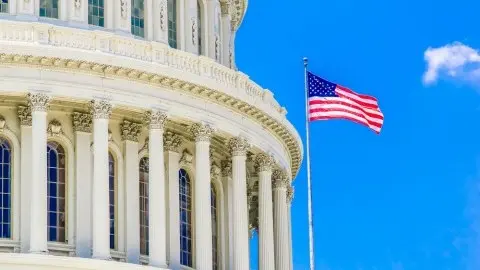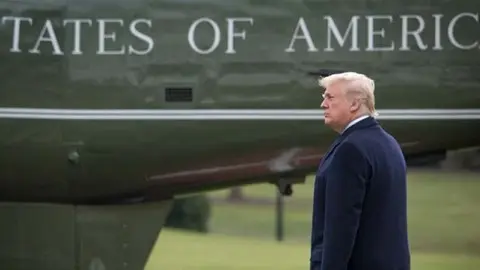Brexit blog: Finally, a fudge?
Reports suggest UK Prime Minister Theresa May is inching towards a compromise on the Irish border issue, which could help break the deadlock in Brexit negotiations. But will it fly with the DUP and Conservative Brexiteers, or even the EU?
Headlines suggest possible UK compromise on Irish backstop
Away from the noise of the Conservative Party Conference, the big story of the week is that Theresa May could be gearing up to propose a compromise with Europe on the contentious Irish border issue. So what does this mean in practice, and crucially, will it be enough to convince UK lawmakers?
The Irish backstop - a quick refresher
First off, a quick recap of why the Irish backstop came about. The UK's long-stated intention to leave the single market and customs union would require new border infrastructure at UK ports - including along the Northern Irish land border. Exiting the single market would mean goods would need to be checked against EU rules, while sitting outside a customs union would require tariff collection and rules of origin checks.
But for a range of political and practical reasons, introducing these processes on the border between Ireland and Northern Ireland is not plausible. For this reason, the EU has proposed a backstop solution that would see Northern Ireland effectively remain in a customs union and the single market for goods, if the rest of the UK does indeed push ahead and leave these arrangements.
That would avoid a hard border within Ireland, but the UK government – which relies on the Northern Irish DUP for its parliamentary majority – has long been concerned this backstop solution would instead simply create a customs and regulatory barrier between Northern Ireland and the rest of the UK. Theresa May has said in the past that “no prime minister” could ever accept this arrangement.
Squaring the circle - the Irish border challenge
But with time running out, the Prime Minister appears to be preparing to blur that particular red line - partially.
Several press reports on Monday indicated that the UK is now prepared to accept that goods flowing to Northern Ireland from the British mainland may need to be checked against EU standards. While this is unlikely to be popular among UK lawmakers, it is not entirely unprecedented. Even now, cattle imports into Northern Ireland from Great Britain must go through the Port of Larne, where they are checked and various certificates must be presented before animals are granted entry. The EU has signalled these checks could be "de-dramatised" further, by moving them away from ports to the farms they originate from to reduce border frictions.
In exchange, the Prime Minister is adamant that the UK as a whole - not only Northern Ireland - must be allowed to remain in a customs union for an extended period, or at least until an alternative technology-based solution comes along. That would prevent the UK being divided into two customs territories, avoiding the need for tariff/rules of origin barriers.
Will this be accepted by lawmakers?
As ever, the big question is whether whatever is agreed between the UK and EU will be voted through by Parliament - and the short answer is that this is not guaranteed.
Conservative Brexiteers are likely to be vehemently against the UK remaining in a customs union for years to come. That would prevent Britain from striking its own trade deals. And given that any technological alternative is likely to take years to develop in reality, it may prompt concerns amongst MPs that the government is trying to keep the UK closer to the EU via a backdoor route. Incidentally, the EU shares a similar concern, in that the UK may be trying to achieve long-term access to the customs union without accepting all of the wider commitments that this normally would come with.
The DUP has also made it clear it won't accept a backstop where there are regulatory checks between Northern Ireland and the rest of the UK - de-dramatised or otherwise. Theresa May could offer them some assurances that the backstop won't actually ever be needed, by indicating that she would be prepared to sign up to the common rulebook for goods - effectively what is contained in the Chequers plan. If the rules are the same in the UK as the EU, then that would rule out the need for most regulatory checks at the border.
We think some kind of mutually acceptable fudge can be found, although it won't be easy
While this would likely enrage Brexiteers further – who are pushing for the UK to ditch EU rules altogether – it may attract some Labour MPs to back the government, given that it is closer to the terms the opposition party set out at its conference last month.
But even if it would secure the critical votes to get through parliament, the EU would likely be reluctant to agree to the UK’s common rulebook plan. Remember, Brussels is chiefly concerned about cherrypicking elements from the single market. Other commentators have suggested May would at the very least need to sign up to a wider range of regulations on goods, as well as give ground on other commitments, for EU leaders to take the proposal more seriously.
A deal is still more likely than not - but the road will be bumpy
In the end, we think some kind of mutually acceptable fudge can still be found, although it won't be easy. After all, the bulk of trade negotiations will be left until after March 2019, so at this stage it will be case of giving MPs enough reassurance in the political declaration that the direction for trade discussions is acceptable. We also suspect Theresa May may try to leave agreeing a deal until as late as possible, in order to focus minds in parliament and make the ‘meaningful vote’ a much more binary choice between her deal, and an economically risky ‘no deal’ scenario.
This means we’re unlikely to know for sure that ‘no deal’ has been avoided until early next year. Until then, the road to Brexit is only likely to get bumpier.
Other things to watch - a new fiscal direction?
In her conference speech, Theresa May announced that the government will end its long-established policy of austerity, hinting that the government will look to boost public spending as part of a spending review next year. Aside from the already-announced NHS spending boost, there are few details of what this will involve. In the short-term, focus will switch to the annual budget in a few weeks time where the Chancellor is unlikely to make any drastic changes
Even before the conference, there were some suggestions that Chancellor Philip Hammond doesn't entirely agree with May's fiscal direction. The Prime Minister has announced that fuel duty will be frozen again, despite Hammond indicating that this would come at a "significant cost". This more cautious approach suggests there are unlikely to be any big policy twists in the budget on 29 October, with the Treasury likely to opt to take a wait-and-see stance given the elevated risk of a 'no deal' scenario.
The decision to hold the budget on a Monday in October - rather than the usual Wednesday slot in November - also suggests that we shouldn't expect too many fireworks.
Key UK forecasts
Download
Download article
5 October 2018
In case you missed it: Finding the silver lining This bundle contains 9 articlesThis publication has been prepared by ING solely for information purposes irrespective of a particular user's means, financial situation or investment objectives. The information does not constitute investment recommendation, and nor is it investment, legal or tax advice or an offer or solicitation to purchase or sell any financial instrument. Read more

